The Top 10 Cardio Device Companies: Highlights from TCT
Medtronic is expected to retain the largest market share through 2020, according to a 2015 report. Find out what the 10 largest companies in the space are doing, including highlights from Transcatheter Cardiovascular Therapeutics (TCT) 2015 in San Francisco.
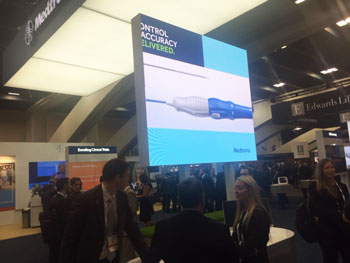
Cardiology remains the second-biggest medical device area by sales, with just under $42 billion in sales in 2014, according to EvaluateMedTech. More than one in every 10 medical devices sold is a cardiovascular device.
The sector has good prospects for future growth, as well. EvaluateMedTech projects that the sector will grow at a compound annual growth rate of 5.1% from 2015 to 2020--one of the healthiest growth rates of any medtech niche.
The sector dominated when it came to the 50% year-over-year increase in PMAs that the medical device industry experienced during the first eight months of 2015, according to EvaluateMedTech (Boston). Worldwide sales in the sector are expected to grow 4.4%, to $54.2 billion, by 2020, with cardiology's share of the global device market ticking up two-tenths of a percentage point to 11.4%.
Here are the 10 companies that EvaluateMedTech expects will lead the cardiology space by 2020, along with descriptions of how their businesses are evolving:
Rank | Company | 2020 Sales (Projected) | 2014 Sales | % Change |
1. | Medtronic | $11.588B | $9.361B | +3.6% |
2. | St. Jude Medical | $6.336B | $5.185B | +3.4% |
3. | Boston Scientific | $6.116B | $5.046B | +3.3% |
4. | Edwards Lifesciences | $3.518B | $2.289B | +7.4% |
5. | Abbott Laboratories | $3.229B | $2.844B | +2.1% |
6. | Johnson & Johnson | $2.620B | $2.208B | +2.9% |
7. | Getinge | $2.514B | $2.061B | +3.4% |
8. | Terumo | $2.332B | $1.778B | +4.6% |
9. | W. L. Gore & Associates | $1.936B | $1.559B | +3.7% |
10. | Lepu Medical Technology | $1.252B | $270M | +29.2% |
1. Medtronic
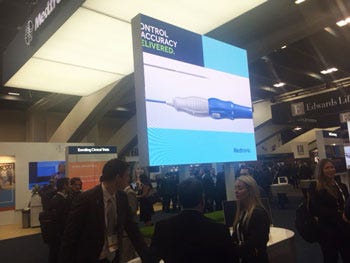 Even after Medtronic's $48 billion merger with Covidien early this year, cardiovascular technology remains the dominant product area for the company, comprising 46% of sales in Medtronic's most recent fiscal year. Before the merger, more than half of the company's revenue came from its cardiovascular segment.
Even after Medtronic's $48 billion merger with Covidien early this year, cardiovascular technology remains the dominant product area for the company, comprising 46% of sales in Medtronic's most recent fiscal year. Before the merger, more than half of the company's revenue came from its cardiovascular segment.
Covidien itself brought a $1.2 billion-a-year cardiology business to Medtronic, so the deal actually further strengthens Medtronic's cardiology dominance, which is expected to continue through 2020, according to EvaluateMedTech.
Medtronic's major challenge going forward will be transitioning from strictly being a manufacturer to being a service provider helping health systems to better manage populations. (i.e. Instead of being a device maker, Medtronic is becoming a chronic disease management company.)
Technologies to watch:
Reveal LINQ insertable cardiac monitor: The Reveal, part of the miniaturization trend with cardiology devices, is one-third the size of a AAA battery, making it more than 80% smaller than other ICMs. One Medtronic-based researcher has even found the LINQ useful for studying hibernation in bears.
CoreValve transcatheter heart valve: The CoreValve has become the major competitor in the U.S. to Edwards' Sapien valves when it comes to transcatheter aortic valve replacement technology. "Unlike other TAVR devices available that have an intra-annular valve, the CoreValve supra-annular design allows the artificial valve to be positioned above the failed surgical valve, which allows for a wider valve opening for blood to flow out of the heart," Medtronic said earlier this year amid an FDA clearance allowing the CoreValve to also be used in "valve-in-valve" replacement.
Micra transcatheter pacing system: Medtronic developed a unique approach to working with electronics, enabling it to make a leadless pacemaker one tenth the size of its predecessor. (The device has won the CE Mark but is not yet FDA approved.) Pacing the heart will likely never be the same.
Evera MRI-compatible implantable cardioverter defibrillator: The Evera ICD system allows for magnetic resonance imaging (MRI) scans positioned on any region of the body.
Drug-Filled Stent. The novel design of the stent is meant to address potential drawbacks experienced with bioabsorbable polymers and polymer-free technologies including inflammation associated with polymer degradation. Medtronic is touting promising initial data in the stent's first clinical trials in humans.
2. St. Jude Medical
St. Jude Medical has been engaged in an "innovation based growth strategy" meant to allow it to offer a whole cafeteria of cardiovascular medical devices that could help health providers treat people with chronic heart disease.
Last week, St. Jude closed on its $3.3 billion acquisition of Thoratec, a major LVAD maker, a deal that further expands its offerings.
Technologies to watch:
CardioMEMS: St. Jude spent $375 million to acquire CardioMEMS amid its FDA approval last year. The device is about the size of a paper clip and uses MEMS technology originally designed to monitor jet engines to remotely monitor a heart failure patient's pulmonary artery pressure.
HeartMate 3: The latest generation of LVAD from Thoratec uses magnetic levitation of the device's rotor to prevent trauma to blood passing through the pump--a problem with previous models. St. Jude on Monday announced that the HeartMate 3 has received CE Mark approval; an ongoing U.S. IDE trial is enrolling more than 1000 patients
Nanostim: St. Jude halted European sales of its own tiny, leadless pacemaker last year after a potentially deadly problem with the technique for implanting transcatheter pacing system was revealed. But the Nanostim pacemaker is returning, at the same time Medtronic's Micra is breaking into the European market, according to Qmed's sister media outlet MD+DI.
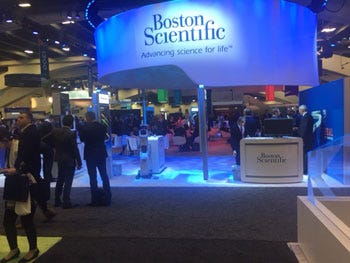
3. Boston Scientific
Boston Scientific's interventional cardiology business has been helping drive the company forward, allowing it to enjoy one of the best-performing medical device company stocks of 2015.
Technologies to watch:
Watchman: The left atrial appendage closure device is a unique stroke treatment device that prevents clots from the heart from reaching the brain. It took years for the product to win FDA approval, which was finally secured this year.
Lotus: Some experts wonder whether Boston Scientific is late to the game on transcatheter aortic valve replacement therapy, with Edwards Lifesciences and Medtronic already dominating the U.S. market. But Boston Sci's Lotus TAVR is showing some success in Europe, where it is already approved. Earlier in the year, the company predicted the device would bring in as much as $200 million by 2016. The Lotus uses a Chinese-finger-trap-like design to better lock into place.
Preventice: Boston Scientific earlier this year bought a 27% stake in wireless heart-monitoring device maker Preventice Solutions. The deal makes Boston Sci the exclusive worldwide sales and marketing representative for Preventice's cardiology diagnostic and monitoring products.
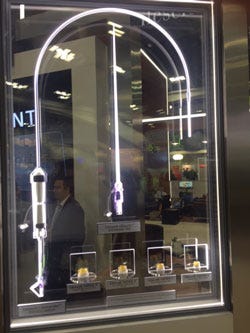
4. Edwards Lifesciences
Edwards has benefitted from solid sales of its Sapien lines of transcatheter heart valves. It is expected to surpass Abbott Labs to become the fourth largest cardiovascular device company by 2020, according to EvaluateMedTech. At TCT, the company is announcing two late-breaking/first report clinical trials involving the company's transcatheter heart valves.
Technologies to watch:
Sapien 3: Approved by FDA earlier this year, Edwards' latest version of its best-selling transcatheter heart valve solves previous leakage issues through a major design change--a skirt at the base of the valve. The device was highlighted in the TCT display to the right.
5. Abbott Laboratories
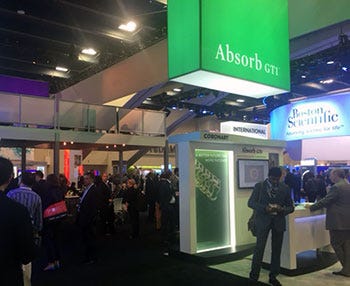
Abbott Labs could potentially cash in on bioabsorbable scaffolds--a market that research and consulting firm GlobalData expects to grow rapidly from $143.7 million in 2014 to $2.1 billion in 2021. Unlike metallic stents, bioabsorbable scaffolds are temporary, dissolving and theoretically keeping vessels more flexible and free from being caged in as they would be with stents.
Abbott is a leader in the space.
Technologies to watch:
Absorb and Absorb GT1 are Bioresorbable Vascular Scaffolds: The drug-eluting bioabsorbable stent is available in the European Union and in select Latin American and Asian countries. Global Data is predicting U.S. approval of the Absorb by next year.
At TCT, Abbott touted a recent NEJM article that found that the Absorb everolimus-eluting bioresorbable vascular scaffold was "inferior" to an everolimus-eluting cobalt-chromium stent at one year.
Supera: The peripheral stent system, approved by FDA last year, is meant to treat people with blocked blood vessels in the upper leg caused by peripheral artery disease. The Supera stent has a unique, proprietary interwoven wire technology meant to mimic rather than resist the artery's natural movement.
6. Johnson & Johnson's Cordis (Now Owned by Cardinal Health) *
Johnson & Johnson appears to be scaling back its presence in the space. This month, it finished selling its Cordis cardiovascular division to Cardinal Health Inc. for $1.944 billion. Cordis is a $780 million-a-year business, perhaps best known for helping to bring drug-eluting stents to market. Cordis' sales are split almost evenly between cardiology devices such as sheaths, wires, and guides--and balloons and endovascular products including both self-expanding and balloon-expanding stents.
Shown to the right is Cardinal Health's booth at TCT, which prominently displays Cordis technology.
7. Getinge
The Swedish company, which makes surgical, intensive care, infection control, care ergonomics, and wound care technology, has been one of the worst performing medical device companies of 2015 when it comes to stock price. It is still struggling to improve efficiency amid weak sales under new CEO Alex Myers.
Getinge announced in September that it will undergo a major overhaul in January.
8. Terumo
Terumo built its cardiovascular business through acquisitions of assets from 3M in 1999 and U.K.-based Vascutek Ltd in 2002. Since then, the company's share price has grown steadily for the most part, and the company has acquired a handful of other cardiovascular firms, including MicroVention Inc., the heart valve division of Kohler Chemine GmbH, and Onset Medical Corp.
At TCT, the company was highlighting its Misago "spineless" self-expanding peripheral stent, which was launched this summer to the U.S. market. Its spine-free design reportedly optimises the stent's radial force applied to the peripheral artery.
Cardio has helped the Japanese company have one of the best-performing medtech stocks of 2015.
9. W. L. Gore & Associates
The privately-held Newark, DE-based manufacturer has a Gore Medical family of products that includes vascular grafts, endovascular and interventional devices, and surgical meshes.
10. Lepu Medical Technology
EvaluateMedTech is predicting that the Chinese medical device company's sales will be nearly five times larger in 2020 than they were in 2014. Founded in 1999, Lepu makes products including interventional cardiology, occlusion devices, prosthetic heart valves, pacemaker, cardiac in vitro diagnosis products, angiographic equipment, and anesthetic products.
Learn more about cutting-edge medical devices at MD&M Minneapolis. |
About the Author(s)
You May Also Like

.png?width=300&auto=webp&quality=80&disable=upscale)
